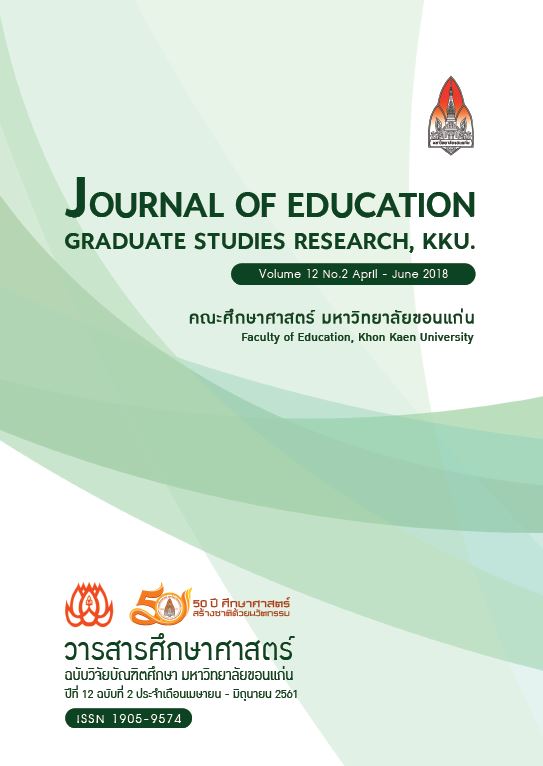The Development of Participative Management Strategies to Promote Internal Quality Assurance System and Mechanism for Faculty of Education of Northern Rajabhat University
Main Article Content
Abstract
The purposes of this research were 1) to develop participative management strategies to promote internal quality assurance system and mechanism for faculty of education of Northern Rajabhat University and 2) to study the quality of participative management strategies to promote internal quality assurance system and mechanism for faculty of education of Northern Rajabhat University. The sample of the study was 13 people including 4 experts in educational administration, 4 experts in educational quality assurance, 3 experts in educational measurement and evaluation, and 2 experts in educational technology. Research tools used in this research were 1) the questionnaire in opinion of experts in considering the quality of the research tools, 2) the questionnaire in opinion of experts in considering the quality of strategies, and 3) the group discussion record form in the process of developing the strategies.The data analysis was to analyse percentage, mean, standard deviation, and content analysis.
The findings of the study were as follows:
- The participative management strategies to promote internal quality assurance system and mechanism consist of 3 strategies. The first strategy was to promote the personnel’s knowledge in the integrated quality assurance. The second strategy was to promote the personnel’s knowledge in the internal quality assurance by using information technology as a supplement. And the third strategy was to promote personnel to participate in the internal quality assurance activities by using knowledge management.
- The participative management strategies to promote internal quality assurance system and mechanism were at a high level. The mean score was at 4.48. When considering each side was found that the opinions were at the highest level. The utility of the strategies and the propriety of the strategies were at the highest level. The feasibility of the strategies were at a high level.
Article Details
References
นุชนารถ ชื่นจุ้ย. (2553). สภาพและปัญหาการดำเนินการ ประกันคุณภาพการศึกษาของคณะแพทยศาสตร์มหาวิทยาลัยนเรศวร. วิทยานิพนธ์รัฐประศาสนศาสตรมหาบัณฑิต สาขาวิชานโยบาย สาธารณะ บัณฑิตวิทยาลัย มหาวิทยาลัยนเรศวร.
รัตนะ บัวสนธ์. (2550). ทิศทางและอาณาบริเวณการประเมิน. (พิมพ์ครั้งที่ 2). กรุเทพฯ: จุฬาลงกรณ์มหาวิทยาลัย.
ศิริขวัญ ยิ่งเจริญ. (2553). สภาพและปัญหาในการดำเนิน การประกันคุณภาพการศึกษามหาวิทยาลัยราชภัฏราชนครินทร์. วิทยานิพนธ์ปริญญาศึกษาศาสตรมหาบัณฑิต สาขาวิชาวิจัยและประเมินผลการศึกษาบัณฑิตวิทยาลัย มหาวิทยาลัยเกษตรศาสตร์.
สมยศ นาวีการ. (2545). การบริหารแบบมีส่วนร่วม. กรุงเทพฯ: บริษัท สำนักพิมพ์บรรณกิจ 1991 จำกัด.
สำนักงานรับรองมาตรฐานและประเมินคุณภาพการศึกษา (องค์การมหาชน). (2549). คู่มือการประเมินคุณภาพภายนอกระดับอุดมศึกษา. กรุงเทพฯ: บริษัท จุดทองจำกัด.
สุรเชษฐ์ บุญยรักษ์. (2555). การศึกษาสภาพและการ ดำเนินงานการประกันคุณภาพคณะครุศาสตร์ มหาวิทยาลัยราชภัฏอุตรดิตถ์. คณะศึกษาศาสตร์ มหาวิทยาลัยเชียงใหม่.
Eisner, E. W. (1976). Educational of connoisseurship and Criticism: Their forms and functions in educational evaluation. Journal of Aesthetic Education, 10(3/4), 135-150.
Wheel, T. L., and Hunger, J. K. (2004). Strategic management business policy. (9th ed). New York: Pearson Prentice Hall.

